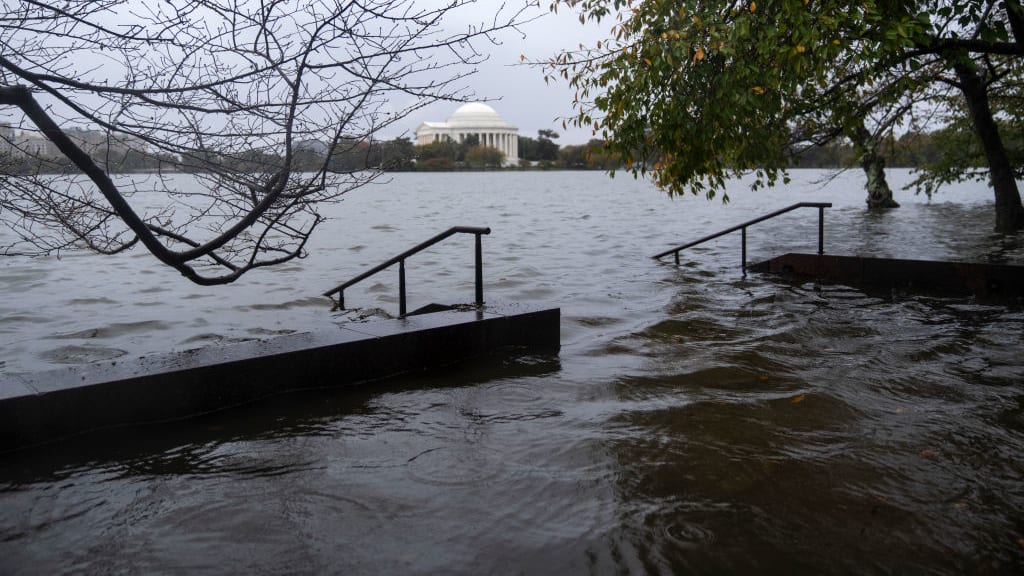In new report, climate scientists estimate U.S. sea levels will rise rapidly by 2050


A free daily email with the biggest news stories of the day – and the best features from TheWeek.com
You are now subscribed
Your newsletter sign-up was successful
A new report from federal climate scientists warns that by 2050, sea levels along coastlines in the United States will rise by 10 to 12 inches.
In the last century, climate change accelerated the melting of glaciers and ice caps, causing oceans to rise by about a foot. Scientists are confident that the pace will pick up even more, with the same amount of sea level rise taking place in the next 30 years.
William Sweet, a sea level rise expert at the National Oceanic and Atmospheric Administration (NOAA) and one of the report's authors, told NPR on Tuesday that it's like "history is repeating itself, but in fast forward."
The Week
Escape your echo chamber. Get the facts behind the news, plus analysis from multiple perspectives.

Sign up for The Week's Free Newsletters
From our morning news briefing to a weekly Good News Newsletter, get the best of The Week delivered directly to your inbox.
From our morning news briefing to a weekly Good News Newsletter, get the best of The Week delivered directly to your inbox.
The report was written by 24 leading climate scientists, using computer models and real-world information to make "the most concrete and certain sea level projections ever published for the U.S.," NPR says. The scientists said by having a more solid grasp on the situation, it will help people plan and prepare.
Rising sea levels are detrimental for a range of reasons, including because it makes flooding during hurricanes more destructive and increases the likelihood of salty water entering water reservoirs, sewers, and storm drains.
Because of ocean currents and the way ice is melting in different regions, sea level rise will not be uniform in the United States. The report estimates that in the Gulf Coast, there will be about a foot and a half of sea level rise by 2050, because land is also collapsing due to extraction of underground oil, gas, and drinking water. On the West Coast, the rise won't be as dramatic, with scientists predicting it will be about six inches.
The report says one way to try to control rising sea levels is by reducing greenhouse gas emissions. "This is unfolding in front of our eyes, whether you're in Miami or Charleston or Norfolk or Annapolis," Sweet told NPR. "It's best to plan before the problems surface. But it's not to say we can't engineer our way out of this. We will find ways to live with the water."
A free daily email with the biggest news stories of the day – and the best features from TheWeek.com
Catherine Garcia has worked as a senior writer at The Week since 2014. Her writing and reporting have appeared in Entertainment Weekly, The New York Times, Wirecutter, NBC News and "The Book of Jezebel," among others. She's a graduate of the University of Redlands and the Columbia University Graduate School of Journalism.
-
 The environmental cost of GLP-1s
The environmental cost of GLP-1sThe explainer Producing the drugs is a dirty process
-
 Greenland’s capital becomes ground zero for the country’s diplomatic straits
Greenland’s capital becomes ground zero for the country’s diplomatic straitsIN THE SPOTLIGHT A flurry of new consular activity in Nuuk shows how important Greenland has become to Europeans’ anxiety about American imperialism
-
 ‘This is something that happens all too often’
‘This is something that happens all too often’Instant Opinion Opinion, comment and editorials of the day
-
 How climate change is affecting Christmas
How climate change is affecting ChristmasThe Explainer There may be a slim chance of future white Christmases
-
 Blue Origin launches Mars probes in NASA debut
Blue Origin launches Mars probes in NASA debutSpeed Read The New Glenn rocket is carrying small twin spacecraft toward Mars as part of NASA’s Escapade mission
-
 Why scientists are attempting nuclear fusion
Why scientists are attempting nuclear fusionThe Explainer Harnessing the reaction that powers the stars could offer a potentially unlimited source of carbon-free energy, and the race is hotting up
-
 Dinosaurs were thriving before asteroid, study finds
Dinosaurs were thriving before asteroid, study findsSpeed Read The dinosaurs would not have gone extinct if not for the asteroid
-
 Canyons under the Antarctic have deep impacts
Canyons under the Antarctic have deep impactsUnder the radar Submarine canyons could be affecting the climate more than previously thought
-
 SpaceX breaks Starship losing streak in 10th test
SpaceX breaks Starship losing streak in 10th testspeed read The Starship rocket's test flight was largely successful, deploying eight dummy satellites during its hour in space
-
 NASA is moving away from tracking climate change
NASA is moving away from tracking climate changeThe Explainer Climate missions could be going dark
-
 Rabbits with 'horns' sighted across Colorado
Rabbits with 'horns' sighted across Coloradospeed read These creatures are infected with the 'mostly harmless' Shope papilloma virus
